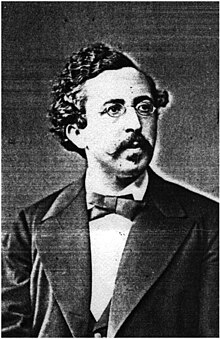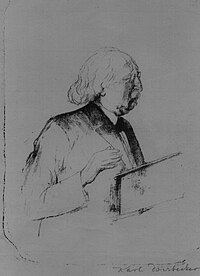Hermann Cohen
Tampilan
| Hermann Cohen | |
|---|---|
 | |
| Lahir | 4 Juli 1842[1] Coswig, Anhalt, Jerman |
| Meninggal | 4 April 1918 (umur 75) Berlin, Jerman |
| Kebangsaan | Jerman |
| Pendidikan | Seminari Teologi Yahudi Breslau Universitas Breslau Universitas Berlin Universitas Halle |
| Era | Filsafat abad ke-19 |
| Kawasan | Filsafat Barat |
| Aliran | Neo-Kantianisme (Mazhab Marburg) |
| Institusi | Universitas Marburg |
| Tesis | Die Systematischen Begriffe in Kants Vorkritischen Schriften Nach Ihrem Verhältniss Zum Kritischen Idealismus (The Systematic Terms in Kant's Pre-critical Writings According to Their Relationship to Critical Idealism) (1873) |
| Mahasiswa doktoral | Paul Natorp[2] |
| Mahasiswa doktoral lain | Ernst Cassirer Nicolai Hartmann Franz Rosenzweig |
Minat utama | Etika |
Dipengaruhi | |
Memengaruhi | |

Hermann Cohen (4 Juli 1842 – 4 April 1918) adalah seorang filsuf Yahudi Jerman. Ia adalah salah satu pendiri sekolah neo-Kantianisme Marburg. Ia sering disebut "filsuf Yahudi paling berpengaruh pada abad kesembilan belas".[3]
Karya
[sunting | sunting sumber]- English translations are indented.
- "Die Platonische Ideenlehre Psychologisch Entwickelt," in "Zeitschrift für Völkerpsychologie," 1866, iv. 9 ("Platonic Ideal Theorie Psychologically Developed")
- "Mythologische Vorstellungen von Gott und Seele," ib. 1869 ("Mythological Concepts of God and the Soul")
- "Die dichterische Phantasie und der Mechanismus des Bewusstseins," ib. 1869 ("Poetic Fantasy and Mechanisms of Consciousness")
- Jüdische Schriften. Introduction by Franz Rosenzweig, edited by Bruno Strauss. Berlin, C. A. Schwetschke: 1924.
- Excerpts have been published in English translation: Reason and Hope: Selections from the Jewish Writings of Hermann Cohen. Translated by Eva Jospe. Cincinnati: Hebrew Union College Press, 1993. (Originally published New York: Norton, 1971, in series: B'nai B'rith Jewish Heritage Classics, with additional material.)
- "Zur Kontroverse zwischen Trendelenburg und Kuno Fischer," ib. 1871 ("On the controversy between Trendelenburg and Kuno Fischer")
- Kant's Theorie der Erfahrung, Berlin, 1871; 2d ed., 1885 ("Kant's Theory of Experience").
- [One central chapter of the 1885 edition is translated as 2015, "The Synthetic Principles," D. Hyder (trans.), in S. Luft (ed.), The Neo-Kantian Reader, Oxford: Routledge.]
- Kant's Begründung der Ethik, Berlin, 1877 ("Kant's Foundations of Ethics")
- "Platon's Ideenlehre und die Mathematik," Marburg, 1878 ("Mathematics and Theory of Platonic Ideals")
- Das Prinzip der Infinitesimalmethode und seine Geschichte: ein Kapitel zur Grundlegung der Erkenntnisskritik, Berlin, 1883 ("The Principle of the Method of Infintesmals and its History: A Chapter Contributed to Critical Perception")
- A short selection is translated as 2015, "Introduction," D. Hyder and L. Patton (trans.), in S. Luft (ed.), The Neo-Kantian Reader, Oxford: Routledge.
- Religion der Vernunft aus den Quellen des Judentums. (1919, repr. Fourier: 1995)
- Religion of Reason out of the Sources of Judaism. Translated, with an introduction, by Simon Kaplan. Introductory essay by Leo Strauss. New York: F. Ungar, 1972.
- "Spinoza über Staat und Religion, Judentum und Christentum" (1915).
- Spinoza on State and Religion, Judaism and Christianity. Translated and with an introduction by Robert S. Schine. Jerusalem: Shalem Press, 2014.
- "Von Kant's Einfluss auf die Deutsche Kultur," Berlin, 1883 ("On Kant's Influence on German Culture")
- Kant's Begründung der Aesthetik, Berlin, 1889 ("Kant's Foundations of Aesthetics")
- "Zur Orientierung in den Losen Blättern aus Kant's Nachlass," in "Philosophische Monatshefte," 1890, xx. ("An Orientation to the Loose Pages from Kant's Literary Estate")
- "Leopold Schmidt," in "Neue Jahrbücher für Philologie und Pädagogik," 1896, cliv.
Catatan
[sunting | sunting sumber]- ^ Poma, A. (2007). Hermann Cohen: Judaism and Critical Idealism. In M. Morgan & P. Gordon (Eds.), The Cambridge Companion to Modern Jewish Philosophy (Cambridge Companions to Religion, pp. 80–101). Cambridge: Cambridge University Press. DOI:10.1017/CCOL0521813123.005
- ^ Stanford Encyclopedia of Philosophy "Hermann Cohen"
- ^ Jewish Virtual Library, Hermann Cohen
Bacaan tambahan
[sunting | sunting sumber]- Bienenstock, Myriam. Cohen face à Rosenzweig. Débat sur la pensée allemande (Paris, Vrin, 2009)
- Bienenstock, Myriam, ed. Hermann Cohen: l'idéalisme critique aux prises avec le matérialisme (special issue of the journal Revue de métaphysique et de morale, ISSN 0035-1571), edited by , Paris, PUF, 2011, 141 pages.
- Bruckstein, Almuth. Cohen's Ethics of Maimonides, translated with commentary, Madison, Wisc. 2004.
- Ephraim Chamiel, The Dual Truth, Studies on Nineteenth-Century Modern Religious Thought and its Influence on Twentieth-Century Jewish Philosophy, Academic Studies Press, Boston 2019, Vol II, pp. 289–308.
- Edgar, Scott. "Hermann Cohen," The Stanford Encyclopedia of Philosophy (Fall 2015 Edition), Edward N. Zalta (ed.), URL = <https://plato.stanford.edu/archives/fall2015/entries/cohen/>.
- Giovanelli, Marco. "Hermann Cohen's Das Princip der Infinitesimal-Methode: The history of an unsuccessful book," Studies in the History and Philosophy of Science Part A, Vol. 58: pp. 9–23, 2016.
- Kaplan, Lawrence. "Hermann Cohen's Theory of Sacrifice", in: Religion der Vernunft aus den Quellen des Judentums. Tradition und Ursprungsdenken in Hermann Cohens Spätwerk (ed. Helmut Holzhey et al.), Hildesheim, 2000.
- Kohler, George Y. "Finding God's Purpose – Hermann Cohen's Use of Maimonides to Establish the Authority of Mosaic Law", in: Journal for Jewish Thought and Philosophy 18:1 (2010), 85–115.
- Morgain, Stéphane-Marie. Le Père Hermann Cohen (1820–1871) – Un romantique au Carmel, Parole et Silence, 2019.
- Moses, Stéphane, et al., (eds.) Hermann Cohen's Philosophy of Religion; International Conference in Jerusalem 1996, Hildesheim, 1997.
- Munk, Reiner. Hermann Cohen's Critical Idealism. Dordrecht: Springer, 2005. ISBN 978-1-4020-4046-7.
- Patton, Lydia. Hermann Cohen's History and Philosophy of Science. Dissertation, McGill University. 2004.
- Patton, Lydia. "The Critical Philosophy Renewed: The Bridge Between Hermann Cohen’s Early Work on Kant and Later Philosophy of Science,” Angelaki 10 (1): 109–118. 2005.
- Piccinini, Irene Abigail. Una guida fedele. L'influenza di Hermann Cohen sul pensiero di Leo Strauss. Torino: Trauben, 2007. ISBN 978-88-89909-31-7.
- Schwarzschild, Steven. "Franz Rosenzweig's Anecdotes about Hermann Cohen", in: Gegenwart im Rückblick: Festgabe für die Jüdische Gemeinde zu Berlin 25 Jahre nach dem Neubeginn, ed. H. A. Strauss and K. R. Grossman, Heidelberg, 1970, S. 209–218.
- Schwarzschild, Steven. "The Democratic Socialism of Hermann Cohen", HUCA 27 (1956).
- Schwarzschild, Steven. "Germanism and Judaism - Hermann Cohen's Normative Paradigm of the German-Jewish Symbiosis", in: Jews and Germans from 1860 to 1933, ed. David Bronsen, Heidelberg 1979.
- Steinby, Lisa. "Hermann Cohen and Bakhtin's early aesthetics," Studies in East European Thought, 63,3 (2011), 227–249.
- Poma, Andrea. The Critical Philosophy of Hermann Cohen, Albany 1997.
- Poma, Andrea. "Hermann Cohen: Judaism and Critical Idealism", in: Michael L. Morgan and Peter Eli Gordon (eds.) The Cambridge Companion to Modern Jewish Philosophy, Cambridge 2007.
- Zank, Michael. The Idea of Atonement in the Philosophy of Hermann Cohen, Providence 2000.
Pranala luar
[sunting | sunting sumber]Wikiquote memiliki koleksi kutipan yang berkaitan dengan: Hermann Cohen.
- Hermann-Cohen-Gesellschaft, promotes research on Hermann Cohen's work and help bring his philosophy to bear in the forum of current debate.
- Hermann Cohen Archives at the University of Zurich, Switzerland
- The Hermann Cohen Society of North America
- (Inggris) Entri Hermann Cohen di Stanford Encyclopedia of Philosophy
- Hermann Cohen, Systematizer of Ethical Monotheism di Wayback Machine (diarsipkan tanggal March 19, 2006), JewishGates
- Digitized archival collection of Hermann Cohen at the Leo Baeck Institute, New York
- (Inggris) Hermann Cohen di Find a Grave
